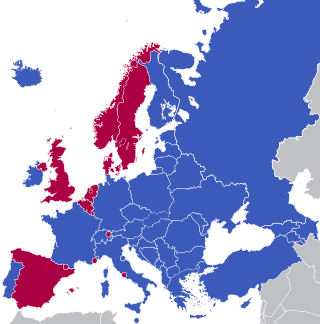Related Research Articles

A constitutional monarchy, parliamentary monarchy, or democratic parliamentary kingdom is a form of monarchy in which the monarch exercises their authority in accordance with a constitution and is not alone in making decisions. Constitutional monarchies differ from absolute monarchies in that they are bound to exercise powers and authorities within limits prescribed by an established legal framework.
A monarch is a head of state for life or until abdication, and therefore the head of state of a monarchy. A monarch may exercise the highest authority and power in the state, or others may wield that power on behalf of the monarch. Usually a monarch either personally inherits the lawful right to exercise the state's sovereign rights or is selected by an established process from a family or cohort eligible to provide the nation's monarch. Alternatively, an individual may proclaim themself monarch, which may be backed and legitimated through acclamation, right of conquest or a combination of means.
A monarchy is a form of government in which a person, the monarch, is head of state for life or until abdication. The political legitimacy and authority of the monarch may vary from restricted and largely symbolic, to fully autocratic, and can span across executive, legislative, and judicial domains.

The monarchy of the United Kingdom, commonly referred to as the British monarchy, is the constitutional form of government by which a hereditary sovereign reigns as the head of state of the United Kingdom, the Crown Dependencies and the British Overseas Territories. The current monarch is King Charles III, who ascended the throne on 8 September 2022, upon the death of his mother, Queen Elizabeth II.
The abolition of monarchy and anti-royalism is a legislative or revolutionary movement to abolish monarchical elements in government, usually hereditary.

A dynasty is a sequence of rulers from the same family, usually in the context of a monarchical system, but sometimes also appearing in republics. A dynasty may also be referred to as a "house", "family" or "clan", among others.
An elective monarchy is a monarchy ruled by an elected monarch, in contrast to a hereditary monarchy in which the office is automatically passed down as a family inheritance. The manner of election, the nature of candidate qualifications, and the electors vary from case to case. Historically, it was common for elective monarchies to transform into hereditary ones over time or for hereditary ones to acquire at least occasional elective aspects.
Regnal numbers are ordinal numbers used to distinguish among persons with the same name who held the same office. Most importantly, they are used to distinguish monarchs. An ordinal is the number placed after a monarch's regnal name to differentiate between a number of kings, queens or princes reigning the same territory with the same regnal name.
A personal union is the combination of two or more states that have the same monarch while their boundaries, laws, and interests remain distinct. A real union, by contrast, would involve the constituent states being to some extent interlinked, such as by sharing some limited governmental institutions. Unlike the personal union, in a federation and a unitary state, a central (federal) government spanning all member states exists, with the degree of self-governance distinguishing the two. The ruler in a personal union does not need to be a hereditary monarch.
The precise style of the British sovereign has varied over the years. It is still chosen and officially proclaimed by the sovereign. The proclamation of Elizabeth II in 1953, was made in English and in Latin.
The Throne of England is the throne of the Monarch of England. "Throne of England" also refers metonymically to the office of monarch, and monarchy itself. The term "Throne of Great Britain" has been used in reference to Sovereign's Throne in the House of Lords, from which a monarch gives his or her speech at the State opening of Parliament.

Monarchy was the prevalent form of government in the history of Europe throughout the Middle Ages, only occasionally competing with communalism, notably in the case of the Maritime republics and the Swiss Confederacy.
A queen mother is a former queen, often a queen dowager, who is the mother of the reigning monarch. The term has been used in English since the early 1560s. It arises in hereditary monarchies in Europe and is also used to describe a number of similar yet distinct monarchical concepts in non-European cultures around the world. The rank does not go to all mothers of monarchs though. A mother of a ruling monarch may only be referred to as Queen Mother if she was a Queen Consort as opposed to a Princess Consort.

Abdication is the act of formally relinquishing monarchical authority. Abdications have played various roles in the succession procedures of monarchies. While some cultures have viewed abdication as an extreme abandonment of duty, in other societies, abdication was a regular event and helped maintain stability during political succession.
Monarchism is the advocacy of the system of monarchy or monarchical rule. A monarchist is an individual who supports this form of government independently of any specific monarch, whereas one who supports a particular monarch is a royalist. Conversely, the opposition to monarchical rule is referred to as republicanism.
References
- ↑ "reign - definition of reign in English | Oxford Dictionaries". Oxford Dictionaries | English. Archived from the original on September 25, 2016. Retrieved 2017-04-09.
- ↑ Robbins, John Fonseca (2015-08-31). Fonseca Robbins´Lexicon. Joinville: Clube de Autores. p. 238.